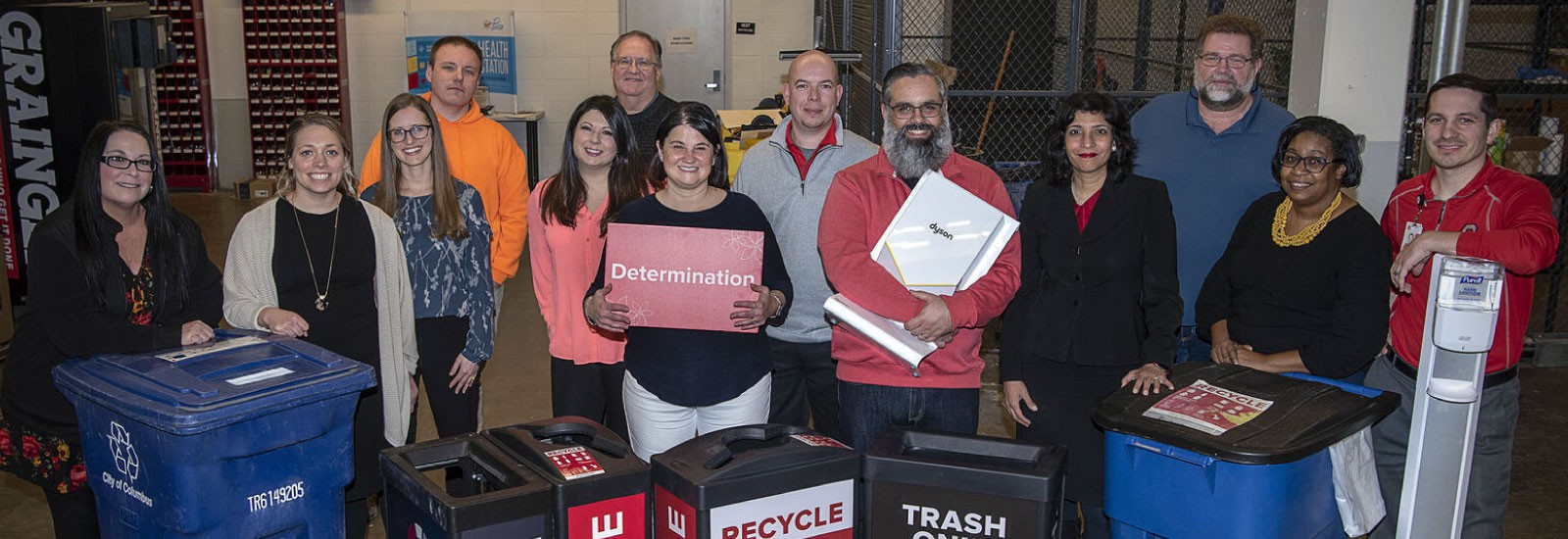Aparna Dial and the sustainability team are putting the Wexner Medical Center value of determination into practice in many ways with their work to protect the planet. As senior director of Sustainability and Strategic Services for both Ohio State and the medical center, Dial says, “Through education, innovation and determination, we’re creating a sustainable campus.”
In essence, that means responsible use of monetary, environmental and human resources—creating efficient processes and eliminating waste.
The application happens when volunteers like Paul Dumouchelle, human resources senior training and development coordinator, leads a campaign at Ackerman to educate the building’s 2,000 employees about what’s recyclable and what’s not for Ohio State’s recycling program.
It took determination to plan the 2019 campaign and re-educate employees about proper items to put into recycling bins, which are located on each floor of the medical center and in most kitchens and break rooms. When too many incorrect items, such as bottle caps, plastics that are not bottle shaped or items with food or liquid residues, are placed into the bins, they “contaminate” them and render all the items in the bin unrecyclable. Those items end up in the landfill, along with more than a million tons of waste being dumped into the SWACO (Solid Waste Authority of Central Ohio) landfill each year, as reported in the Columbus Dispatch in August 2019.
“Pay close attention to what you put in the recycling bin. It just takes some discipline,” Dumouchelle urges all employees.
Five weeks after the education took place at Ackerman, the contamination rate of recycling bins dropped from 69% to 42%.
Dumouchelle, who is one of hundreds of “Green Team” volunteers who have joined Dial and her office in their sustainability efforts, says, “It’s challenging to make changes to basic human behavior. The pressures of time, convenience and inertia push against sustainability practices.”
From Computer Searches to Trees
Another sustainability success began when Wendelyn Oslock and two other medical students from Ohio State College of Medicine launched a campaign to promote use of a German-based Ecosia search engine. In exchange for searches, Ecosia plants trees. The search engine is used across more than 20,000 medical center staff devices and is set as the default search engine through Internet Explorer.
“At a time when news about climate change can be demoralizing, it’s encouraging to know that there are more than 50,000 new trees planted because of our collective efforts. It makes our team feel like we’re doing our part to help address this critical issue,” Oslock says.
She says it takes determination to discuss projects like this with naysayers—people who focus on hurdles rather than potential solutions. “Continuing to work through these conversations while maintaining a positive attitude has been hard, but worthwhile.”
From Consumers to Conservers
Dial notes that Tim Sutton, administrative director for the hospital’s supply chain, has produced impressive wins for the environment in his first two years at Ohio State. With the determination of Sutton and his team, accomplishments include:
- Eliminating plastic straws across the medical campus
- Reducing cleaning chemicals from 30 types to 10, many of which are more environmentally friendly
- Increasing the percentage of the supplies budget used for environmentally preferred products from 2% to 72%
An Ongoing Commitment
“Sustainability is the daily work of each of us—in what we choose to consume, how we travel, how we live our everyday lives,” Dial says. She says that goes for both individuals and departments.
Dial praises the dedication of loyal volunteers like Dumouchelle. “The people who are attracted to this kind of work are those who are committed to something bigger than themselves. They want to make the world a better place and do meaningful work. This work is not easy, and the solutions are not obvious—all the more reason that we need to have the determination to reach our highest potential despite obstacles,” Dial says.
Learn more about sustainability efforts at the Wexner Medical Center.
